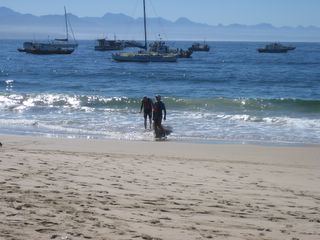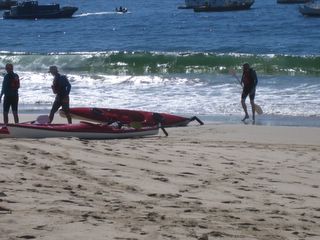
I contemplated getting down on my hands and knees and kissing the beach.
In the heart of South Africa’s Garden Route lies Plettenberg Bay. By the beach, there is a shop that serves as a headquarters for a company called Ocean Blue. They run all manner of adventure tours - skydiving, shark, dolphin and whale safaris - and they also offer a novice the chance to have a go in a kayak.
In a few weeks, I’m heading to Nottingham to get shown the ropes in a racing kayak; until I go, I can only guess that the main difference between a racing kayak and one designed for a life on the ocean wave is that while the former is designed to go a fast as possible on a flat surface, the design of the latter places a higher priority on not going to the bottom of the ocean at a similar pace.
I got out of bed at 6:45 this morning. A quick glance out the window confirmed that the weather was fine for kayaking. I shuffled to the shower, which probably sounds like a stupid place to head when you’re about to wade out into the Indian Ocean dragging a kayak behind you, but I had to do something to try and make myself feel better - that last visit to the whisky bottle at the end of the night is always the killer.
Showered (but still shuffling), I forced down some orange juice and a bowl of fruit on my way to the beach. The first thing I noticed when I got there was the height of the waves - from the hotel on the hill above the bay, the sea had looked like a millpond; down here in the thick of things, there was a bit more to contend with than I’d hoped for.
There were four boats in our group: one double and three singles. I was lucky to snag one of the singles. Our skipper, Gareth, talked us through the basics. Push with the top hand, don’t pull with the bottom hand; if a big wave comes, point the boat into it, never across it; if a shark comes closer to your boat than you’re comfortable with, just bang the hull with your paddle and it will go away.
“Shark?”
“What’s that, sorry?”
“You said shark.”
“Yeah, but only if we’re very lucky.”
Hoping to be very lucky in a slightly different way to Gareth, I dragged my boat down to the water’s edge. Gareth took the nose and led me out past where the waves were breaking onto the beach. I hopped in and he shoved me off with a vague instruction to wait for him by some buoys a few hundred yards out. I set off toward them, banging the hull with alternate strokes. Better to be safe than sorry.
We left the buoys as a group and paddled into the sun. My shoulders began to ache about ten minutes into the two-hour trip, but at least I didn’t feel sick. I was surprised at how quickly we escaped first the noise of the beach, and then the sight of it. At the beach, the breaking waves were maybe two or three feet high - a kilometre out to sea there was enough of a swell that I occasionally found myself unable to see anything other than water.
The alcohol from last night was making me tired, but at least I didn’t feel sick.
Gareth stopped every so often to talk to us about where we were and the things he’d seen before. One member of our group asked him about sharks - had he really ever had one come close to his boat? On the beach, talk of sharks had been slightly disconcerting; out here in the silently swaying vastness it felt almost foolhardy - like tempting fate. I hoped Gareth would tell us that he hadn’t ever encountered a shark out here. I hoped Gareth would say than none of the Ocean Blue skippers ever had. I hoped Gareth would tell us more about the dolphins.
“I had a great white sit on my tail and then beside me for about 40 metres once.” I was disappointed. I clung to the hope that maybe he was about to tell us a story about meeting Greg Norman, who had been in the area scuba diving. “I didn’t really know what to do. His dorsal fin was out of the water, and the water is so clear, I could see his pectoral fins perfectly.” Not Greg then. “He just sat there, keeping pace with me.”
The hull, man! Why didn’t you bang the hull?
“I couldn’t really bang the hull without missing a stroke and therefore slowing down, and I didn’t want to slow down in case he swam into me and then took a nibble to see what I was.” The others laughed. I think I might have whimpered.
Thank God it is the South African summer. I’ve seen the Discovery Channel, I know that sharks tend to prefer the cooler waters.
“We wouldn’t see one at this time of the year though, would we?” said someone that sounded a bit like me.
“There are certainly fewer of them around in the summer, but you still see them occasionally, but only if they let you see them. It’s not like in the movies - you don’t get the cello music to warn you! You’ll just turn around and he’ll be there.”
I resolved to at no point ‘turn around’ and to try and ignore the cello music that now filled my head.
“I feel so lucky to have seen one. It was a real thrill. A real privilege.”
Again I noted a difference in our interpretations of the word ‘lucky’ - I’d have felt lucky too - and I would have taken great pleasure in telling everyone I ever met all about the great white shark I had encountered, but I would have been telling them from the shore, because I wouldn’t have been getting back in the water.
Still, at least I wasn’t feeling sick.
I'm not sure I have the legs to pull off this look.
We repeated the scenario often - we’d paddle for a while, then we’d stop and Gareth would tell us about other animals he had encountered. His stories may have been ones he tells every time he goes out, but he told them well, and his passion and knowledge were, in equal measure, impressive and inspiring.
He told us how to tell the difference between the blows of various whales, and that what they’re blowing isn’t sea water, but condensation that builds up on the inside of their vast, warm lungs. He pointed out terns diving for fish. He explained the difference between a ground swell and a wind swell.
We were in a wind swell, which meant the swell was irregular, which was probably why I was feeling sick.
We paddled on. We had come a couple of kilometres out from the shore and then paddled parallel to it for about an hour before we started to loop back round, at first towards the beach, and then parallel again, but much closer in. I don’t know whether it was a coincidence or a scientific fact, but the swell was getting worse as we got closer to land. I was really feeling sick now, and I was falling behind.
I fantasised about someone appearing in a speedboat and asking if I wanted a lift. I daydreamt about Gareth signalling that it had gotten too rough and we ought to just head in a straight line back to the beach and carry the boats back. I wondered if sharks were attracted to the smell of whisky-laced vomit. I suspected not, but I used the possibility that they might be to stop myself chucking up for a good ten minutes.
As I reached my lowest ebb - my stomach churning, my arms aching and shaking from trying (and failing) to keep up with the group - I thought again about my Olympic challenge, about all the events I have to do, about the physical endurance required for so many of them, and about my seeming predisposition to want to quit just about everything I start.
I laughed ruefully at my previous notion that my impending trip to Nottingham might see me complete all eleven canoeing and kayaking disciplines in a weekend. At the rate I was going this morning, I’ll be doing well to cover one or two in those two days - assuming, that is, that I manage to reach a suitable level of basic proficiency to even have a go at any of them.
I stopped paddling and just bobbed around for a while as the others moved on. By now, they were probably a hundred yards ahead. I had a choice to make: I could either try and deposit my breakfast over the side and hope that made me feel better enough to paddle on, or I could signal to Gareth that I was really struggling and needed some help.
“Dolphin!” someone bellowed. I felt my heart jump. Perhaps my kind of luck (rather than Gareth’s) might be in. All illness and tiredness disappeared as I pounded the water with the paddle and used my feet to control the rudder.
And then, not quite as suddenly as you’d expect, there they were: a pod of four Indo-Pacific humpback dolphins. At this part of the beach, nearer the estuary, the waves were much bigger. The pod surfaced just behind the breakline several times, about twenty or thirty yards from where we watched.
Gareth talked to us about them as we sat there staring at them. They’re very rare - only 600 off this bit of coast - they can move from salt to fresh water without a problem and therefore like to feed near the estuary. Their Atlantic cousins have been known to chase fish into the nets of fishermen.
They weren’t leaping, but they did get high enough out of the water that I could see almost the whole animal. I was warned before I saw them that they were “beyond words” and it would seem that was right. It was a moment I’ll never forget.
Soon they disappeared (no doubt thrilled with their “human safari adventure”) and we resumed the long slog back to our starting point. I was encouraged by the fact that I had been able to pull myself together enough to get to the dolphins, and by the fact that we were now moving in roughly the same direction as the swell, so I put my head down and paddled on.
They say that a high percentage of car accidents happen within a few miles of the car owner’s home; I nearly established a similar proximity rule for kayaking as I neared the shore. I forgot one of Gareth’s rules and let the boat get sideways on to the vicious 36-inch waves. My dismount was slightly less elegant than I’d planned, but I was glad that I had waited to fall out until the water only came up to my knees.
Sea Kayaking in South Africa
Saturday, March 19, 2005
Posted by John McClure at 11:35 am
Subscribe to:
Post Comments (Atom)
2 comments:
Sounds fab. And if you're lucky, you may stumble upon a nice flock of pike in those Nottinghamshire waters...
I'm no expert, but I'd be willing to wager a fair sum that the collective term for pike isn't 'flock' - and I'd go double or quits on there not being any in a man-made lake at a water sports centre.
At least, I hope there aren't - very nasty bite.
Post a Comment